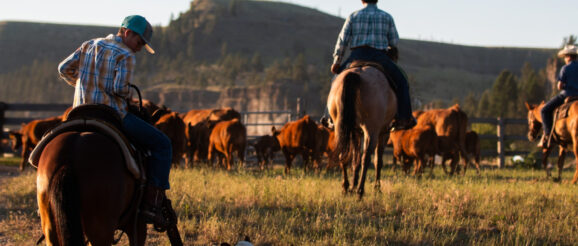BLM Announces Winners of the Rangeland Stewardship and Innovation Awards | Morning Ag Clips

WASHINGTON — The Bureau of Land Management today [September 5, 2023] announced winners of the 2023 Rangeland Stewardship and Rangeland Innovation awards, which recognize exemplary management and outstanding accomplishments in restoring and maintaining the health of public rangelands.
The awards were be presented Sept. 6, at a ceremony hosted by the Public Lands Council during its 55th Annual Meeting, held this year in Pendleton, Ore. The BLM and Public Lands Council have partnered for 18 years to honor BLM livestock grazing permittees and lessees who demonstrate exceptional management, collaboration, and communication that restores, conserves, or enhances our public lands, and to recognize their accomplishments at a gathering of their peers.
“The spirit of these awards honor generations of American ranchers who have promoted healthy public lands for the benefit of current and future generations,” said BLM Director Tracy Stone-Manning. “The addition this year of the Rangeland Innovation Awards builds on this legacy by encouraging new grazing methods and technologies on public lands necessary for adapting to the challenges of a changing climate.”
“The health and resiliency of Western landscapes depend on federal lands ranchers more than anything else and these awards recognize the excellence of these ranchers, who continually produce more and conserve more with less,” said Public Lands Council President Mark Roeber. “PLC is proud to partner with the BLM to build up and promote the vital work these ranchers do to protect critical wildlife habitat, improve the health of native grass stands, and reduce catastrophic wildfires. I want to congratulate the award recipients for their tireless efforts in livestock production and conservation – this is not an easy job and these ranchers are always striving to get better at what they do.”
The Rangeland Stewardship Awards recognize the demonstrated use of beneficial management practices to restore, protect, or enhance rangeland resources while working with the BLM and other partners.
The Larsons have subdivided the BLM Apex Slope Allotment into ten pastures and implemented grazing practices more flexible to changing conditions and pasture rotations based on rangeland and soil health conditions. These methods contribute to improved watershed function, wildlife habitat, forage diversity, and habitat resilience.
The mule deer population has suffered greatly in Arizona’s Game Management Unit 18A over the last several decades, and hunting permits have been reduced from a high of 2,000 to only 350 today. This landscape-level restoration project, which is located between Kingman and Seligman, Ariz., focuses on conifer removal to increase the production of grasses, forbs, and browse species important to mule deer. Mechanical treatments are planned for over 50,000 acres of BLM-administered public lands and habitat improvements are anticipated across 250,000 acres through Federal, State, NGO, and private partnerships. Project partners include the BLM Kingman Field Office and two BLM permittees, Crozier Ranch and X-One Ranch, as well as the Cross Mountain Ranch, Denny Ranch, Double O Ranch, Dunton Ranch, Fort Rock Ranch, U.S. Fish and Wildlife Service Partners for Fish and Wildlife Program, Arizona Department of Forestry and Fire Management, Arizona State Land Department, Big Sandy Natural Resource Conservation District, Prescott Valley Natural Resource Conservation Service, Arizona Antelope Foundation, Arizona Deer Association, Arizona Elk Society, Arizona Mule Deer Organization, Mule Deer Foundation, Pheasants Forever and Quail Forever, and Rocky Mountain Elk Foundation.
The Rangeland Innovation Awards recognize outstanding examples of demonstrated creativity, willingness to embrace change, and/or a modified perspective or approach to persistent rangeland stewardship challenges in addition to the accomplishments meriting the Rangeland Stewardship Award.
Milton Ranch has used holistic resource management grazing for over thirty years, consistently adjusting livestock numbers and management to respond to changes in climatic and vegetative conditions, and has implemented temporary non-renewable grazing adaptable for positive resource conditions, higher precipitation years, and increased biomass.
These ranches co-founded RMG in 2016 to collaborate with ranchers, scientists, and non-profit conservation groups on a pilot project in Montana focused on using rangeland monitoring and collective knowledge to inform and improve land management. Partners include the U.S. Fish and Wildlife Service, U.S. Geological Survey, Montana State University, Bird Conservancy of the Rockies, Crossroads Ranch Consulting, National Audubon Society, Point Blue Conservation Science, Soil Carbon Coalition, Synergy Resources, The Nature Conservancy, and Western Sustainability Exchange.
The Public Lands Council represents the cattle and sheep producers who hold approximately 22,000 public lands grazing permits. Federal grazing permit holders provide essential food and fiber resources to the nation, as well as important land management services like the eradication of invasive species, mitigation of wildfire risk, and conservation of vital wildlife habitat. The Public Lands Council works in active partnership with the BLM, the U.S. Forest Service, the National Park Service, the U.S. Fish and Wildlife Service, and local land management offices to make landscapes more resilient across the West.
— BLM
